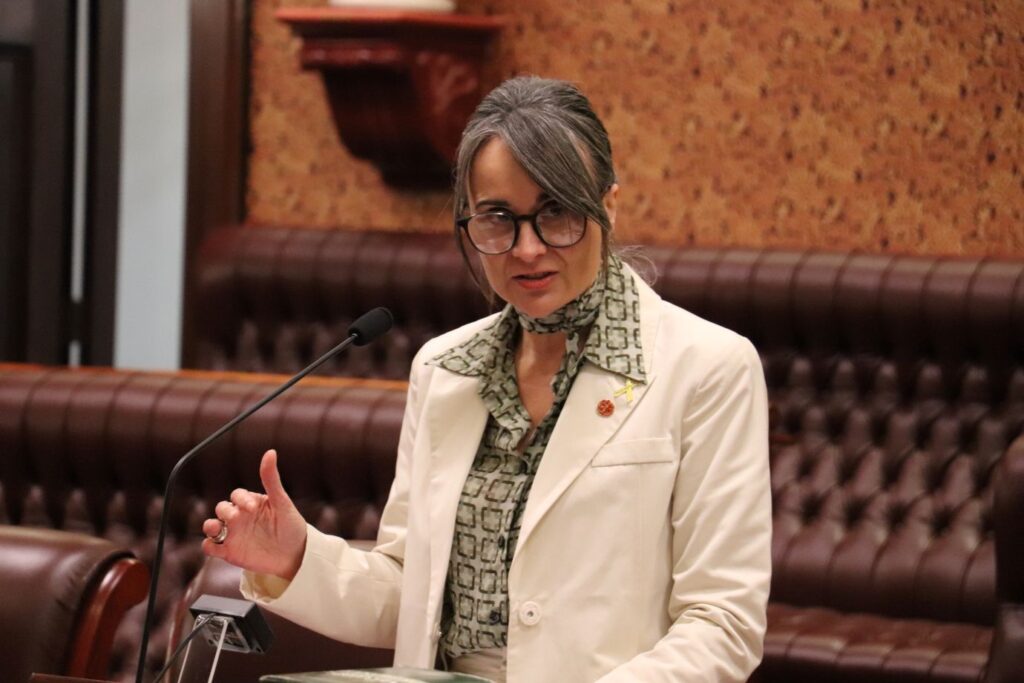Member of the NSW Legislative Council Dr Sarah Kaine is concerned about Mark Latham’s behaviour in parliament. She shares this piece on the importance of culture inside one of our most visible workplaces.
As the New South Wales parliamentary winter recess comes to an end, I am reflecting on the environment female politicians and staffers are walking into.
Let’s be clear – I do not care about Mark Latham‘s private life, but I do care about behaviour in parliament. Recent media reports have detailed allegations against Latham that go far beyond parliamentary sparring. From sending explicit messages from the chamber floor to taking covert photos of female MPs and making degrading comments about their appearance, the behaviour described is deeply concerning. Premier Chris Minns said it plainly: “In a typical workplace, he’d be gone tomorrow.”
While taking surreptitious photos of female colleagues is the epitome of ‘ick’, contributions from the dispatch box are also very revealing. The floor of parliament often witnesses sharp words and spirited disagreement. The cut and thrust of debate is part of the job—and I welcome it. But when Mark Latham responded to my recent speech on gender equality in the workplace, his remarks went beyond policy critique. They were dismissive and revealing.
He accused me of representing “everything wrong with the modern Labor Party,” mocked the inclusion of gender in industrial relations reform, and reduced decades of advocacy to a caricature. In isolation, it might be chalked up to political theatre. But in context, it’s part of a troubling pattern.
I didn’t feel particularly offended by the offhand nature of his comments to me—parliamentary debate is often intense and like most 50-year-old women, it takes more than a shallow remark to get to me. But Latham’s remarks weren’t just about disagreement; they reflected a broader attitude that sees gender equality as a distraction rather than a necessity. That attitude matters. Because words said in passing often signal beliefs held in full.
Parliament, at its core, is more than debate—it is also a mirror. It reflects who we are and what we tolerate. If degrading behaviour is normalised we send a dangerous signal. Culture in any institution is shaped not only by its formal rules but by what goes unchallenged. When gender equality is mocked or trivialised, it does more than belittle a policy initiative—it undermines the lived experience of women, their safety in the workplace, and their right to be treated with dignity. And for those watching—young people considering public service, women stepping into leadership—it sends a message about whose voices are valued, and whose concerns are brushed aside.
Let’s be clear: gender equality isn’t a fringe issue. It’s central to justice, productivity, and the future of work. And when someone reacts with contempt to that idea, it tells us something—not just about their politics, but about the culture they’re comfortable with.
This isn’t about one man or one moment. It’s about whether the culture inside one of our most visible workplaces lives up to the standards the public rightly expects. So I’m setting aside the distaste, shelving the outrage, and choosing resolve instead—resolve to confront poor behaviour head-on and push for change.
Because if we want parliament to reflect the values of the people it represents, then silence isn’t an option. We have to name the problems, challenge the conduct, and lead with the respect and decency that the people of New South Wales deserve.
Feature image: Dr Sarah Kaine.
Become a Women’s Agenda Foundation member and support our work! We are 100% independent and women-owned. Every day, we cover the news from a women’s perspective, advocating for women’s safety, economic security, health and opportunities. Foundation memberships are currently just $5 a month.
Bonus: you’ll receive our weekly editor’s wrap of the key stories to know every Saturday.


